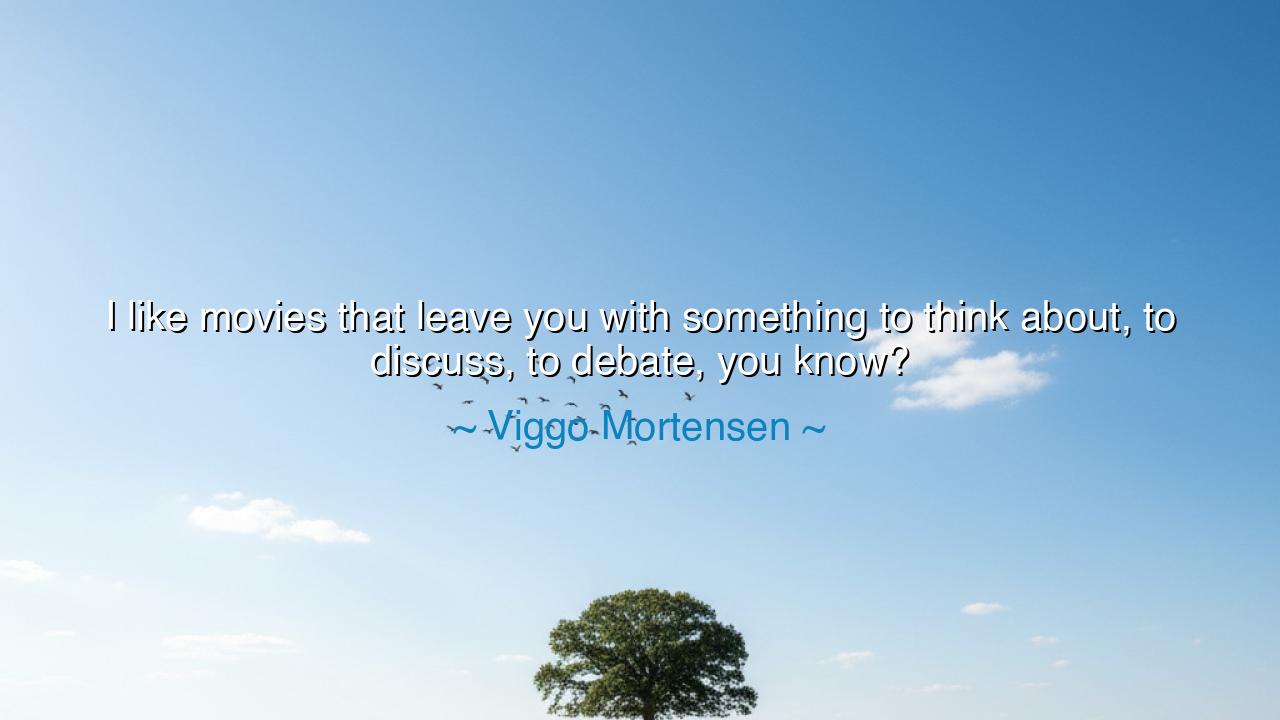
I like movies that leave you with something to think about, to
I like movies that leave you with something to think about, to discuss, to debate, you know?






In the grand theatre of human existence, there are those moments—captured in the flicker of film—that stir something deep within the soul. Viggo Mortensen, in his reflection on cinema, speaks to the power of a story that transcends the immediate: "I like movies that leave you with something to think about, to discuss, to debate, you know?" These words reveal a profound truth about the nature of art—that its highest purpose is not merely to entertain or distract, but to challenge, to provoke thought, and to ignite conversation. Films, like the great epic tales of the ancients, should serve as a mirror for society, reflecting both the beauty and the flaws of the world, and urging us to contemplate, discuss, and understand our own place within it.
Consider the ancient philosophers—figures like Socrates, who did not simply deliver answers, but engaged in the art of dialogue. His conversations were not designed to provide easy solutions, but to provoke deep questioning. Socrates believed that true wisdom arose not from unquestioned certainty, but from the continuous pursuit of understanding through dialogue and debate. This practice of questioning and challenging beliefs is reflected in Mortensen’s love for movies that stimulate the mind, pushing us beyond passive entertainment and into the realm of active reflection. Just as Socrates sought to engage his followers in thought-provoking exchanges, so too do great films serve as catalysts for the mind and soul, encouraging us to reflect on the nature of our world.
The great epics of the ancient world—works like the Iliad and the Odyssey—were not just stories of adventure and conflict. They were, at their core, stories that questioned the very nature of honor, fate, and humanity. The heroes of these tales—figures like Achilles and Odysseus—embodied the complex struggle between personal ambition and greater purpose, between the immediate desires of the body and the long-term consequences of their choices. Mortensen’s preference for films that spark debate mirrors the ancient tradition of storytelling that sought to confront the viewer or listener with difficult questions, often leaving them to ponder the true meaning of the tale long after the story had ended. These films, like the ancient epics, are not just to be consumed but to be engaged with, debated, and examined.
In the ancient world, theater was a place not just for entertainment but for reflection on society and morality. Think of Sophocles’ Oedipus Rex, where the audience is forced to grapple with the nature of fate, blindness, and self-awareness. The play did not offer easy answers, but rather left its audience in a state of reflection, questioning the balance between free will and destiny. This tradition of art serving as a mirror to the soul is precisely what Mortensen speaks to when he values films that leave the audience with something to debate. A movie that simply entertains without provoking deeper thought risks becoming insubstantial—it may provide temporary pleasure, but it does little to nourish the soul or challenge the mind.
In modern cinema, films like 12 Angry Men or A Clockwork Orange fulfill this same function, forcing the audience to confront moral, ethical, and societal issues head-on. These films ask uncomfortable questions about justice, freedom, and society, and they refuse to provide easy resolutions. Just as the ancient storytellers challenged their listeners to grapple with the complexities of human nature, so too do these films challenge the modern audience to think, to question, and to debate. In this way, Mortensen’s preference for thought-provoking cinema aligns perfectly with the traditions of ancient art, which sought not to comfort but to provoke, to inspire dialogue, and to foster a deeper understanding of the human condition.
The lesson we must take from Mortensen’s words is this: true art—whether in film, literature, or music—is not about passively consuming content, but about actively engaging with it. It is not about simply seeking entertainment or escape, but about allowing the work to stir us, to challenge our assumptions, and to invite us into a space of critical thought. Like the ancient philosophers and poets, we must not only observe the world around us, but actively question it, debate it, and strive to understand the deeper truths that lie beneath the surface.
As you move forward in your own life, seek out those works of art—whether in the form of films, books, or conversations—that leave you with something to ponder. Let these works stir you to question, to reflect, and to engage with the world in a deeper way. Do not settle for the superficial or the easily digestible, but strive to immerse yourself in art that challenges your thinking and pushes you to grow. Just as Socrates engaged in the pursuit of wisdom through dialogue and debate, so must we allow the art we encounter to lead us on a path of deeper understanding. In the end, it is not the answers we find that shape us, but the questions we ask and the discussions we have along the way.






AAdministratorAdministrator
Welcome, honored guests. Please leave a comment, we will respond soon